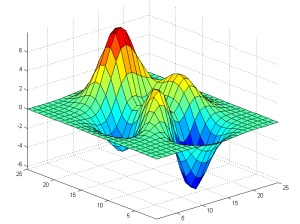
|
Homepage |
Welcome to the class website for Introduction to Numerical Analysis . Numerical approaches play an important role in many fields including in scientific research, engineering, finance, machine learning, and data analysis. This class will discuss both the mathematical foundations and the practical implementation of modern numerical methods. Examples also will be discussed from related applications areas.
Please be sure to read the prerequisites and grading policies for the class.
Selection of Topics Covered in 104 Series:
- Floating Point Number Representation
- Round-off Error
- Algorithms and Convergence
- Catastrophes Caused by Errors in Numerical Algorithms
- Finding Zeros of Equations (Bisection, Newton's Method)
- Interpolation Methods
- Numerical Differentiation
- Numerical Integration
- Adaptive Quadratures
- Initial Value Problems for ODE's
- Euler's Method
- Higher-Order Methods (Explicit / Implicit)
- Multistep Methods
- Stability
- Stiff Differential Equations
- Numerical Linear Algebra
- Power Method for Eigenvalues and Eigenvectors
- Iterative Methods for Solving Ax = b
- Preconditioners
- Multigrid Methods
- Application Areas
- Engineering and the Sciences
- Statistical Inference, Machine Learning, Data Science
- Computer Graphics and Visualization
- Financial Modeling and Economics
Prerequisites:
Calculus, Linear Algebra, Differential Equations, and some experience programming.
Grading:
The grade for the class will be based on the homework assignments (see policy below), midterm exam, and final exam as follows:
Homework/Quizzes 30%
Midterm Exam 30%
Final Exam/Project 40%
Policies:
To help give feedback throughout the quarter there will be unannounced pop quizzes at the beginning of some lectures. One lowest quiz scores will be dropped. Homework and other assignments will be given in class and posted on the course website. Prompt submission of homeworks will be required. While no late homework will be accepted, one missed homework will be allowed without penalty. While it is permissible and encouraged for you to discuss materials with classmates, the submitted homework must be your own work.
Class Announcements:
- Midterm Outline [PDF].
Supplemental Materials:
- Python: [documentation python 3.7] [general tutorial] [Codecademy]
- Numpy python package: [tutorial]
- Integrated development environments: [PyCharm]
- Jupyter Notebooks: [python interface]
- Python environment manager: [Anaconda]
- LaTeX typesetting [documentation] [summary sheet]
- Python Debugging with PDB: [Tutorial]
- Linux Operating System: [Ubuntu] [Summary Sheet] [Tutorial]
- Example Python Code:
- Neville's Method: [PDF] [Python Code] [Jupyter Notebook]
Homework Assignments:
Turn all homeworks into the TA's mailbox Andre Martins Rodrigues or Alan Raydan in South Hall 6th Floor by 3pm on the due date. Graded homeworks will be returned in class.
TAs Office Hours in South Hall (SH):
- Alan Raydan: Wed 10:30am-11:30am in SH 6431S, Thurs 5pm-7pm in MathLab in SH 1607.
- Andre Martins Rodrigues: Monday 12:30pm - 1:30pm in SH TSH 6432K, Wed 5pm-7pm in MathLab in SH 1607.
Example python code : Neville's Method [PDF] [Python Code] [Jupyter Notebook]
Midterm Outline [PDF]
All problems below are from Numerical Analysis by Burden and Faires (10th edition) unless otherwise noted.
HW1: (Due Wednesday, January 15) 4.1 2ab, 4, 6bc, 8, 23, 29; 4.3: 1bce, 3bc, 5bc, 15bc;
HW2: (Due Friday, January 24) 5.1: 1acd, 3, 5, 6cd, 7, 10; 5.2: 2ab, 4ab, 5cd, 7, 10, 12, 16; 5.3: 1bd, 3, 6bc, 8, 10.
HW3: (Due Friday, January 31) 5.4: 2bcd, 3ab, 7, 11, 15, 17, 19, 27, 32.
HW4: (Due Friday, February 7) 5.6: 2bcd, 4bcd, 6, 12, 13, 17, 19. 5.9: 1ab, 4ab, 6, 7.
HW5: (Due Friday, February 14) 5.10: 1, 2, 4, 6, 7; 5.11: 2bc, 4, 6, 8, 11, 13.
HW6: (Due Friday, February 21) 6.1: 1bd, 3, 5, 7bd, 12, 14; 6.2: 1bc, 3, 7, 10bc, 12;
HW7: (Due Friday, February 28) 6.3: 3bc, 5bc, 9; 6.4: 2, 6; 6.5: 3, 6, 11, 13; 7.1: 2cd, 4cd.
HW8: (Due Friday, March 6) 7.1: 8cd, 9, 13; 7.2: 2af, 4, 6; 7.3: 2cd, 4, 6, 10, 16.
Edit: Main | Menu | Description | Info | Image | Log-out | GS |